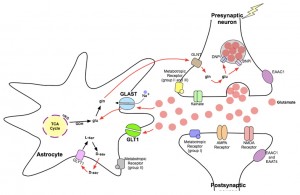In a recent study published in Proceedings of the National Academy of Sciences, researchers found an unexpected effect of the neurotransmitter (or signal substance) in the midbrain known as glutamate.
 “We have found that a certain part of the brain’s reward system requires not only the signal substance dopamine, as was previously thought, but also glutamate,” said the director of the study at Uppsala University, Department of Neuroscience. Among many things, dopamine is important for the brain’s control of willed movements and the “reward system,” which provides humans with feelings of pleasure and happiness. The feeling is mediated by dopamine being released from nerve cells in the midbrain to the brain’s limbic system. The reward system is also affected by addictive drugs. Previous studies have shown nerve cells to “co-transmit” glutamate and dopamine, but science was unsure what this entailed for the the function of the brain.
“We have found that a certain part of the brain’s reward system requires not only the signal substance dopamine, as was previously thought, but also glutamate,” said the director of the study at Uppsala University, Department of Neuroscience. Among many things, dopamine is important for the brain’s control of willed movements and the “reward system,” which provides humans with feelings of pleasure and happiness. The feeling is mediated by dopamine being released from nerve cells in the midbrain to the brain’s limbic system. The reward system is also affected by addictive drugs. Previous studies have shown nerve cells to “co-transmit” glutamate and dopamine, but science was unsure what this entailed for the the function of the brain.
To address this question, the researchers in the current study developed a special mouse model whose dopamine nerve cells lack the ability to both use and release glutamate. When they were treated with the dopamine-releasing substance amphetamine, a clear effect was observed. Normal mice responded, as expected, with increased activity and more stereotypical movements. On the other hand, the reaction in the model mice was significantly reduced, showing that a certain part of the reward system needs not only the signal substance dopamine, as was previously believed, but also glutamate. (PhysOrg.com)
“When we take away the glutamate,” the director said, “the brain’s reward system is numbed, which is extremely interesting.” Especially, in understanding how the reward system is formed and functions, as well as better understanding the diseases that affect it. “We hope our studies will ultimately provide relevant knowledge for an understanding of addiction mechanisms in humans.” The researchers will continue their study of the nerve cells involved to gain further insight into how important this system is for addiction.


